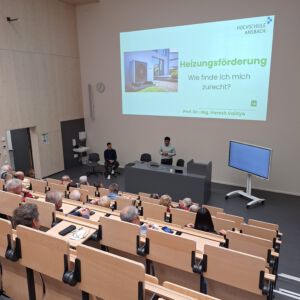Insight into current heating subsidies
Professor Vaidya presents the valid programs in the Energy Talk
Last Wednesday, October 16, 2024, the Energy Talk at the Feuchtwangen campus took place in the university’s new lecture hall for the first time. Campus Coordinator Dr. Gerd Hofmann was delighted to welcome around 40 guests. The focus of the event was a presentation by Campus Director Prof. Dr.-Ing. Haresh Vaidya, who gave a comprehensive overview of current heating subsidies. In particular, he focused on the various KfW programs that support the installation of environmentally friendly heating systems in existing buildings.
He particularly emphasized the basic subsidy, which promotes the replacement of heating systems that rely on at least 65% renewable energy. This primarily includes heat pumps, solar thermal systems and biomass heating systems as well as connection to a heating network. However, he pointed out that this funding is not available for new buildings or heating systems that use fossil fuels such as gas or oil.
In addition to this basic subsidy, there are various bonuses that are granted under certain conditions. For example, owners who act quickly receive an additional climate speed bonus, while owner-occupiers with an annual household income of no more than 40,000 euros can apply for a further bonus of 30%. This can increase the total funding to up to 70% of the eligible costs.
Another important topic was the question of which heating systems are eligible for funding. Here, Prof. Vaidya mentioned the aforementioned heat pumps, biomass systems and solar thermal systems, but also so-called “H2-ready heating systems”, which are suitable for the use of hydrogen. There is also a limit on the amount of eligible costs, which are set at a maximum of 30,000 euros per measure. With the additional bonuses, however, up to 70% of these costs can be covered. Interested parties must submit the application via the “My KfW” online portal, but only after concluding a contract with a specialist company, which only becomes valid once the funding has been approved.
In the subsequent discussion round, there was a lively debate on the topic of heating modernization. Dr. Gerd Hofmann advised the participants not to replace the heating system as the first measure if further renovations such as improving the insulation or replacing windows are planned anyway. A new heating system would be designed to meet the building’s current energy requirements. If the insulation were to be improved or windows replaced at a later date, the heating requirement would drop significantly, which could lead to the heat pump being switched on and off frequently and affect its service life. Laboratory engineer and energy consultant Oliver Abel added that particular care should be taken when replacing windows. The new windows should be precisely matched to the insulation values of the surrounding walls in order to avoid moisture problems that could damage the building fabric in the long term. He advised having an energy consultant draw up an individual renovation roadmap to ensure that the various measures are coordinated optimally .
Dynamic electricity tariffs were also one of the evening’s topics. PhD student Thomas Haupt explained that there are already providers such as Tibber or Rabot Charge that offer these tariffs. From 2025 on, it will also be mandatory for all electricity providers to offer at least one dynamic tariff. However, the biggest challenge at present is still the insufficient expansion of the smart meter infrastructure required for the hourly billing of these tariffs.

